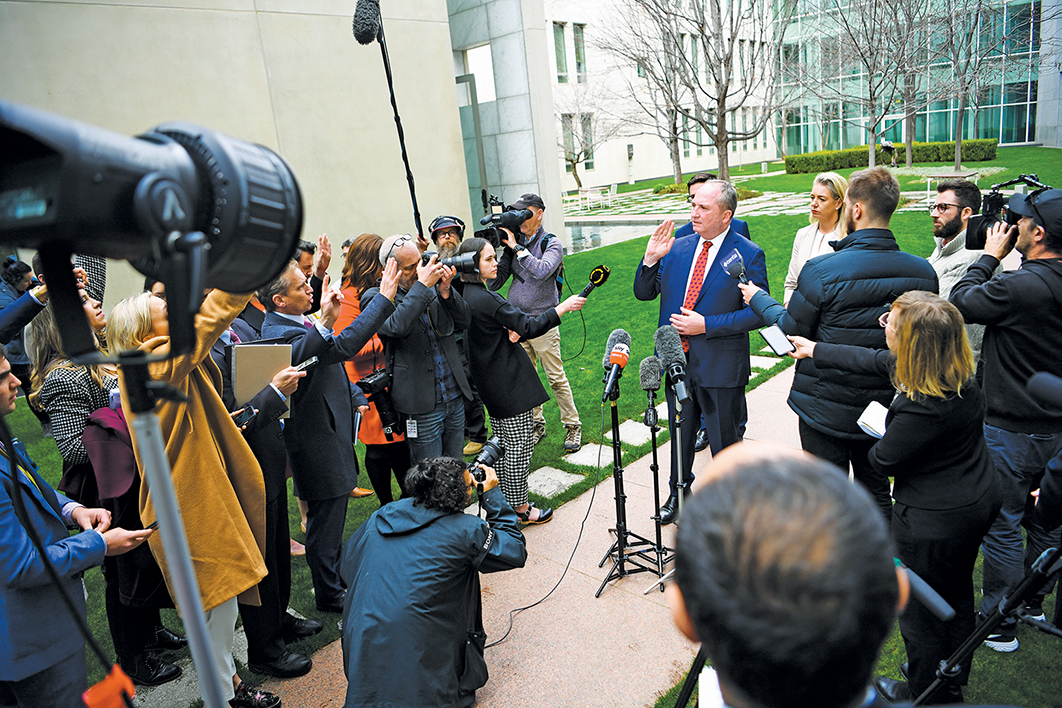Barnaby Joyce’s affair with his staffer, Vikki Campion, was the major catalyst for Malcolm Turnbull’s elegantly titled “bonk ban” in 2018. But it is not the reason for Joyce’s resignation as Nationals leader.
There’s no denying the heat around Joyce was very real. Three years ago, there was huge pressure on him to resign — from all sides of politics, including his own. Questions over his travel expenses were thrown into the mix. There was awful attention on his wife, four daughters and Campion, who was pregnant with his son.
Despite this, Joyce hung on to the deputy prime ministership until an allegation of sexual harassment emerged against him. He denied the claim, but conceded it needed to be investigated. “It’s quite evident that you can’t go to the despatch box while issues like that are surrounding you,” he reasoned in a press conference in Tamworth. He resigned the same day.
Fast-forward to 2021 and Joyce is back at the despatch box. But the allegation has not been definitively resolved.
We don’t have specific details of the claim. The woman involved, Catherine Marriott, has said she does not want to make these public, lest she be defined by them. But we do know the Western Australian businesswoman alleges Joyce sexually harassed her at a Canberra function in 2016. At the time, Joyce was the high-profile agriculture minister.
“Directly afterwards… I walked up to my hotel room and I burst into tears. I then couldn’t sleep that whole night. I didn’t actually sleep for a week,” she told 7.30 in 2018. “I rang two of my closest friends and I told them what had happened and they said they couldn’t believe it. They were just absolutely shocked.”
She didn’t report it initially, she says, given the obvious power and publicity dynamics. But in February 2018 — at the height of the scandal over Joyce’s affair — she made a complaint to the National Party, asking for things to be kept confidential. The complaint and her name turned up in the Daily Telegraph within days.
The claims were investigated by the NSW branch of the party, with the WA-based Marriott making three trips at her own expense across the country to be interviewed. The investigation reportedly found she was “forthright, believable, open” and “genuinely upset.” But by September 2018, it could not reach a conclusion, citing “insufficient evidence.” Unlike Marriott’s name, the final report was not released.
Joyce maintains the allegations are “spurious and defamatory.” Marriott describes the experience of coming forward as “horrific.”
Already, Joyce’s return is setting off a fusillade of fireworks — from his attempt to blow up the Murray–Darling Basin Plan and block any progress on climate policy, to Nationals MPs opining that childcare is “outsourcing” parenting, and general anxiety about Joyce’s plans to stick it to Scott Morrison. Plenty to distract from the sexual harassment claim hovering in the background.
But Joyce is now our deputy prime minister and potential acting prime minister. He not only leads the National Party, he also represents the entire country. Can you think of any other industry where this would not be a really big deal?
Then again, we have become used to senior ministers doing their jobs and picking up pay cheques with some cloud over their performance or behaviour. As well as Christian Porter, the cabinet includes Stuart Robert, who was dumped from the ministry in 2016 over a trip to China, his own financial interests, a Liberal Party donor and ministerial standards. There is Sussan Ley, who resigned in 2017 over an investment-property expenses scandal but was back in cabinet two years later. And Michaelia Cash, who was demoted in 2018 after her office tipped off media about union raids, resulting in a messy court case. She was cleared of wrongdoing and got a hefty promotion to attorney-general this year.
Then there’s Melissa Price, dumped from cabinet in 2019 following severe lack of cut-through in her portfolio, and Linda Reynolds, demoted this year after her catastrophic handling of Brittany Higgins’s rape claim, yet still in cabinet. Bridget McKenzie resigned last year during the sports rorts scandal, but is expected to return as part of the Joyce revival.
Also continuing to sit around the cabinet table are Angus Taylor, who used a doctored document to attack Sydney lord mayor Clover Moore on climate change, and Alan Tudge. The education minister has already apologised for having an affair with his former media adviser, Rachelle Miller. This year, Miller hired lawyers to bring a workplace harassment suit against Tudge, claiming she was bullied. Staff of home affairs minister Karen Andrews and Indigenous Australians minister Ken Wyatt have also made bullying claims, which the ministers “strenuously” deny.
That takes the tally to eleven ministers out of a cabinet of twenty-three, with another — McKenzie — likely to be on the way.
Cabinet ministers with question marks over their suitability are not unheard of. And there are precedents — on both sides of politics — for a cabinet comeback. Graham Richardson resigned over the Marshall Islands affair in 1992 but was back in Paul Keating’s team the very next year. Peter McGauran resigned from John Howard’s junior ministry over travel claims in 1997 but made it to cabinet by 2005. More recently, Kevin Rudd’s final cabinet in 2013 featured Joel Fitzgibbon, who had resigned as defence minister over a conflict of interest in 2009 — and, of course, Rudd himself, who had made the ultimate comeback after his colleagues fired him in 2010 for running a chaotic government.
But they were at least the exception rather than the trend. These days managing ministerial performance bears uncanny similarities to managing the behaviour of a small child — go and sit in the time-out chair for a little bit and you can still be a cabinet minister as if nothing happened. Perhaps Nationals MPs should stop worrying about the fact mums go to work and look at cabinet appointments instead. •




